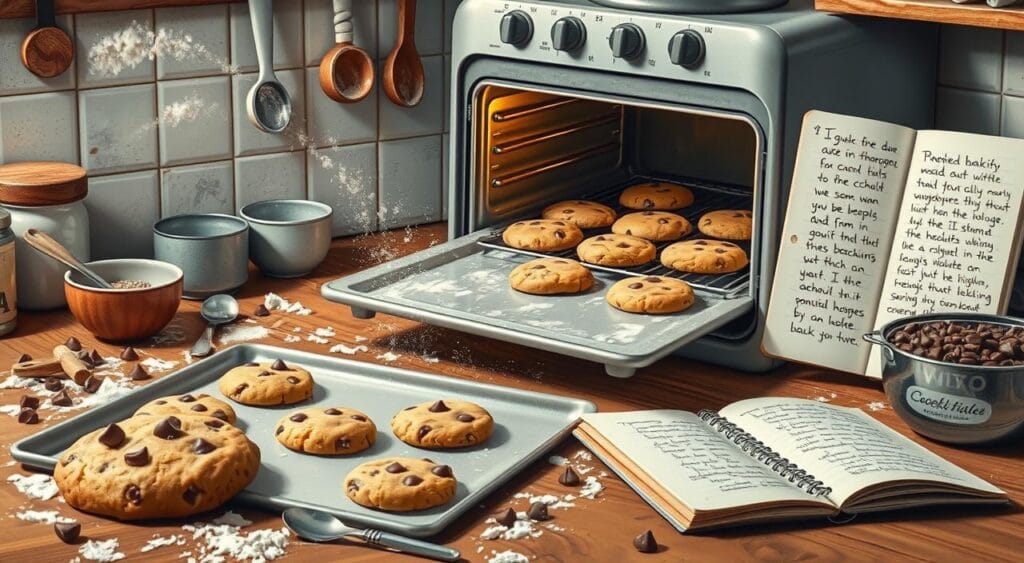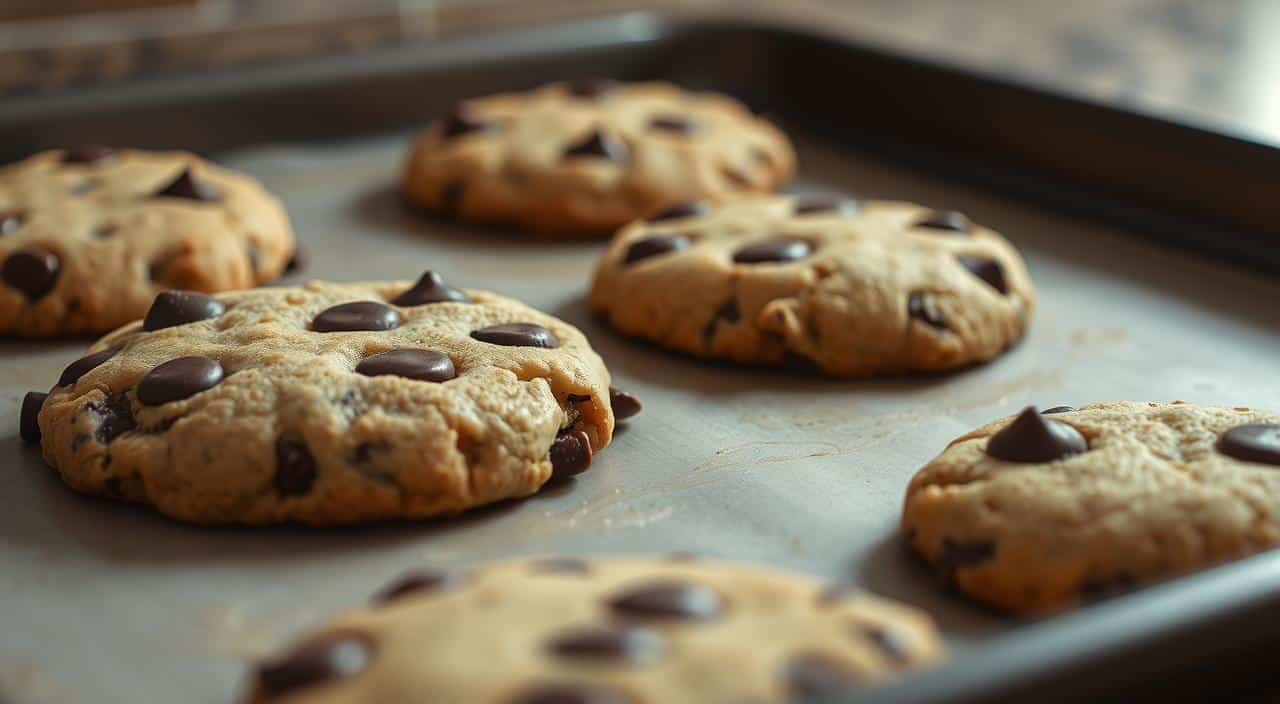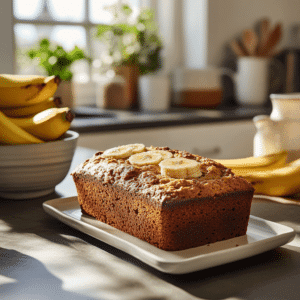Jump to:
Estimated reading time: 9 minutes
Table of contents
Have you ever baked Toll House cookies only to find them flat and disappointing? Many home bakers face this issue, leaving them frustrated. We’re here to help you fix this problem and get the perfect, thick, chewy cookies you love.
Knowing the key ingredients for cookie dough is vital for baking Toll House cookies. We’ll look at why cookies might turn out flat, like wrong butter temperature, mixing the dough too much, or not enough baking powder or soda. By fixing these mistakes, you can make delicious cookies that everyone will love.
Why are my Toll House cookies always flat? Key Takeaways:
- Incorrect butter temperature and overmixing can lead to flat chocolate chip cookies
- Chilling the dough and proper measuring of ingredients can prevent flat cookies
- Adjusting ingredient ratios and baking temperature can help achieve the perfect cookie thickness
- Using parchment paper instead of greased pans can improve cookie texture
- Experimenting with cookie thickness and troubleshooting flat cookies is key to mastering Toll House cookie baking
Introduction
Many home bakers aim to make the perfect chocolate chip cookies. But, sometimes, they turn out flat and thin. This can be frustrating, especially if you want that thick and chewy texture. If you’ve ever had this problem, you’re not alone. Many bakers face issues like this, but you can fix it with some cookie troubleshooting tips.

When your cookie dough looks like cake batter, it can be upsetting. You might think you made a mistake or missed a step. Knowing the difference between cookie dough and cake is important. Cookie dough should be thick and hold its shape, unlike cake batter which is thinner and more fluid.
Several things can make cookie dough turn out like cake batter, such as:
- Adding too much liquid ingredients
- Not using enough flour
- Overmixing the dough
- Using too much leavening agent
- Incorporating melted butter instead of softened butter
- Skipping the crucial step of chilling the dough
The path to perfect chocolate chip cookies is paved with a bit of trial and error, but armed with the right knowledge, you’ll be well on your way to cookie success.
There are ways to fix your cake-like batter and get the perfect cookie dough consistency:
| Problem | Solution |
|---|---|
| Too much liquid | Gradually add more flour until the desired consistency is reached |
| Overmixed dough | Chill the dough for at least 30 minutes before baking |
| Thin, spreading cookies | Use thickening agents like cornstarch or refrigerate the dough before baking |
| Melted butter | Use softened butter instead and avoid overmixing |
By figuring out what went wrong and using the right fixes, you can make perfect chocolate chip cookies. Let’s explore more cookie troubleshooting tips to help you achieve those thick, chewy cookies you love.
Common Causes of Flat Toll House Cookies
When baking Toll House cookies, it can be disappointing to find them flat and thin. Several common causes include incorrect butter temperature, overmixing cookie dough, and not enough leavening agents. Knowing these can help you avoid cookie spreading and get the thick cookies you want.
Incorrect Butter Temperature
Using butter that’s too soft or melted is a common reason for flat cookies. Warm butter makes cookies spread a lot during baking. The Cravory says butter should be around 68°F (20°C) for the dough. This temperature helps the butter mix well with sugar, making fluffy cookies that don’t spread much.
Overmixing the Dough
Overmixing the dough can also make cookies flat. Too much mixing develops gluten, making the cookies tough and dense. This also makes them spread more in the oven. To prevent this, mix the dough just until it’s combined. Don’t use a high-speed mixer.
“Overmixing cookie dough can lead to flat, dense cookies. Mix just until the ingredients are combined for the best results.”
Insufficient Baking Powder or Soda
Leavening agents like baking powder and soda are key for cookies to rise and keep their shape. If your Toll House cookies are flat, you might not have enough of these agents. Always use the recipe’s specified amount and check they’re fresh.
| Ingredient | Purpose | Effect on Cookie Spread |
|---|---|---|
| Butter | Provides flavor and texture | Too soft or melted can cause spreading |
| Sugar | Adds sweetness and helps with browning | Too much can lead to spreading |
| Leavening Agents | Help cookies rise and maintain shape | Insufficient amounts can result in flat cookies |
By knowing these common causes of flat Toll House cookies, you can bake perfect, thick, and delicious cookies every time.
How to Prevent Flat Toll House Cookies
If you’ve been struggling with flat Toll House cookies, don’t worry! There are ways to make sure your cookies are thick, chewy, and perfectly shaped. Just make a few changes to how you bake, and you’ll get the cookies you want.
Chilling the Dough
Chilling the dough is a great way to stop your cookies from getting flat. The butter in the dough gets hard when it’s cold, which helps the cookies keep their shape while baking. Wrap your dough in plastic wrap and keep it in the fridge for 30 minutes to an hour before baking.
Pro Tip: If you have the time, chilling your dough overnight can lead to an even more flavorful and well-structured cookie!
Proper Measuring of Ingredients
Getting your ingredients right is key to avoiding flat cookies. Too much sugar or liquid makes cookies spread too much. Always measure ingredients correctly, like using dry cups for flour and sugar, and liquid cups for wet ingredients.
| Ingredient | Proper Measuring Technique |
|---|---|
| Flour | Spoon flour into a dry measuring cup and level off with a knife |
| Sugar | Spoon sugar into a dry measuring cup and level off with a knife |
| Butter | Use the markings on the butter wrapper to measure out the required amount |
| Vanilla Extract | Pour vanilla extract into a liquid measuring cup at eye level |
Using Parchment Paper vs. Greased Pans
The surface you bake on affects your cookies’ shape and thickness. Parchment paper helps cookies keep their shape better than greased pans. If you don’t have parchment paper, lightly grease your pans to prevent sticking without spreading too much.
- Line your baking sheets with parchment paper for the best results in preventing flat cookies
- If using greased baking sheets, be sure to only lightly grease the surface to minimize spreading
By chilling your dough, measuring ingredients right, and using parchment paper or lightly greased pans, you’ll make perfect, thick Toll House cookies.
Adjusting the Recipe for Flat Toll House Cookies
If you’re always getting flat Toll House cookies, don’t worry! You can easily fix this by changing a few things in your recipe. Adjusting ingredient ratios, the oven temperature, and how thick you make the cookies can help. This will turn your flat cookies into ones that are thick and chewy, just like from a bakery.
Altering Ingredient Ratios
Changing the mix of ingredients can help stop flat cookies. Try adding a bit more flour to give your cookies more structure. Or, cut down on sugar and liquids like eggs or vanilla to stop them from spreading too much.
Here’s a table showing how to change the ingredients for thicker cookies:
| Ingredient | Original Amount | Adjusted Amount |
|---|---|---|
| Flour | 2 1/4 cups | 2 1/2 cups |
| Sugar | 3/4 cup | 2/3 cup |
| Brown Sugar | 3/4 cup | 2/3 cup |
| Eggs | 2 | 1 |
Baking at the Right Temperature
Baking at the right temperature is key to avoiding flat cookies. If your oven is too hot, cookies will spread too much and become flat. Always preheat your oven and check it with an oven thermometer to make sure it’s at the right temperature before baking.
The ideal baking temperature for Toll House cookies is 375°F (190°C). Baking at this temperature helps cookies spread just right, giving them a perfect thickness and texture.
Experimenting with Cookie Thickness
The thickness of your cookie dough affects the final cookie. For thicker, chewier cookies, make the dough balls taller instead of flattening them. Use a cookie scoop or roll the dough into bigger balls.
Here are some tips for cookie thickness:
- Use a 1 1/2 tablespoon cookie scoop for uniform, thick cookies
- Chill the dough balls for 30 minutes before baking to prevent excessive spreading
- Gently press a few extra chocolate chips onto the surface of each dough ball for a professional look
With these simple recipe adjustments, you’ll soon be baking perfect, thick, and delicious Toll House cookies every time.
Frequently Asked Questions: Why are my Toll House cookies always flat?
Why do my Toll House cookies always turn out flat?
Flat cookies can be caused by a few factors, including the temperature of the ingredients, over-creaming the butter, or an imbalanced ratio of ingredients. If the butter is too warm or soft, the dough may spread too quickly in the oven, resulting in flat cookies.
How does butter temperature affect Toll House cookies?
If the butter is too warm or melted, it can cause the cookies to spread too much, making them flat. For best results, use room-temperature butter that is slightly cool to the touch. This helps the dough hold its shape while baking.
Could over-mixing the dough make my cookies flat?
Yes, over-mixing the dough can incorporate too much air, causing the cookies to collapse and spread during baking. To prevent this, mix the dough just until the ingredients are combined. Avoid over-creaming the butter and sugar, which can also contribute to flat cookies.
Conclusion: Achieving Perfect, Thick Toll House Cookies
Now you know how to make perfect chocolate chip cookies that are thick and chewy. Pay attention to ingredient temperatures and measure carefully. Making small changes to the recipe will help you bake cookies that taste like they’re from a bakery.
Understanding why cookies turn out flat is key to making them thick and chewy. Chilling the dough, using the right tools, and trying different cookie thickness can make a big difference. With practice and patience, you’ll get better at baking cookies that everyone loves.
Next time you want to bake Toll House cookies, remember these tips. Use the perfect cookie dough recipe and advice from this article to make cookies that are tasty and look great. You’ll impress your friends and family with your baking skills. Enjoy the joy of making the best chocolate chip cookies ever.






